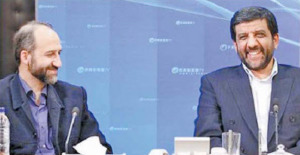
November 14-2014
Supreme Leader Ali Khamenehi has elevated the deputy director of state broadcasting to be the head of all radio and television in the country.
Mohammad Sarafraz has headed international broadcasting for the government for two decades. In that role, he created PressTV, Iran’s English language outlet, Al-Alam, the Arabic language station and, HispanTV, which broadcasts in Spanish and is part of Iran’s effort to have a role in Latin America.
Sarafraz will replace Ezzatollah Zarghami, who has completed 10 years as head of Islamic Republic of Iran Broadcasting (IRIB), as the complex of dozens radio and television stations is known.
It isn’t known what Zarghami will do now. Before Zarghami, Ali Larijani, who is now speaker of the Majlis, headed the system for a decade. Before that, Mohammad Hashemi-Rafsanjani, the brother of the man who was then speaker of the Majlis, headed state broadcasting for a decade.
There is no private broadcasting allowed in Iran. The Shah maintained radio as a state monopoly but allowed a private television station. That was shut down after the revolution.
Both Zarghami and Sarafraz have been sanctioned by the European Union and the United States as human rights violators for airing forced confessions on state broadcasting.
Zarghami had a run-in with President Rohani shortly after Rohani took office when the president refused to be interviewed on the air by Zarghami’s chosen interviewer, who was viewed as hostile by Rohani.
Zarghami also made headlines five years ago when he barred women—but not men—from wearing makeup on the air, saying that violated Sharia law.
In 2006, listeners were surprised when state radio carried a program three weeks running in which a number of those interviewed questioned the value of Iran’s nuclear program and suggested it wasn’t needed.
